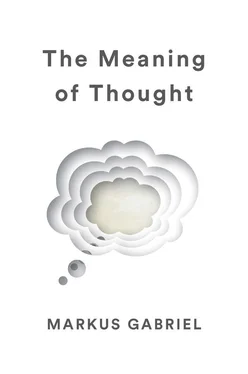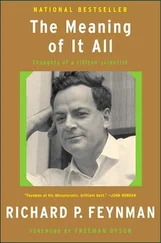I would also like to express my gratitude to the team working at my chair: Walid Faizzada, Marin Geier, Mariya Halvadzhieva, Jens Pier, Jens Rometsch and Jan Voosholz, for their comments on an earlier version of the book and for their help in putting together and preparing the final manuscript.
1 1. Georg Wilhelm Friedrich Hegel, ‘Hegel an Schelling [End of January 1795]’, in Johannes Hoffmeister (ed.), Briefe von und an Hegel (Hamburg: Meiner, 1969), pp. 15–18, here p. 18.
The present book is the concluding part of a trilogy that began with Why the World Does Not Exist and continued with I am Not a Brain . Yet I have written it so that it can be understood without any acquaintance with its two predecessors. All three books have the same intended audience: anyone who likes to engage in philosophical thinking. And it is precisely this phenomenon, thinking, that is my topic in this book. Over the course of the following pages I will develop a theory of (human) thought that anyone should be able to understand.
Thought is perhaps the central concept of philosophy. Ever since Plato and Aristotle, philosophy has been understood as a science that thinks about thinking. Thinking about thinking is the origin of logic. Logic, in turn, is one of the foundations of our digital civilization, as, were it not for advances in philosophical logic in the nineteenth century, computer science would never have developed. In this regard, George Boole (1815–1864) and Gottlob Frege (1848–1925) were especially influential. Both were mathematicians, logicians and philosophers, and both set out a theory of thought which they used as the basis for developing the first systems of symbolic logic, the systems which underlie contemporary computer science. They thus did much to prepare the way for the digital revolution of our own day.
You are about to read a philosophical book free from opaque technical jargon. To follow the central arguments, there is no need to have worked your way through the technical aspects of logic. The main thesis I am going to advance is that human thought is a sense organ. Thinking is aesthetic (in the best case, something pleasurable) and not an exercise of force, discipline, punishment or blind, creativity-stifling rule-following. On the contrary: philosophical thought is a creative process, which is why philosophers such as the Romantics or Friedrich Nietzsche even went so far as to (try to) push it into the same camp as poetry.
Yet philosophy is ultimately neither quite like mathematics nor quite like poetry (or indeed any other art form). It borders on both domains, forming a point of intersection between the two.
Philosophy is the most general way of thinking about our thinking. It is more general still than mathematics, which is itself a form of language and thought that serves as a foundation for the natural sciences and technology. However, while not utterly unrelated to them, mathematics doesn’t give us the foundation of poetry, painting, religion, music or philosophy. What unites all of these highly sophisticated human phenomena is our sense of thought, and the structure and nature of this sense are the object (and subject) of philosophy. For philosophy is thought thinking itself.
At the same time, philosophy is much closer to the concrete phenomena of our everyday lives than many believe. It wants to get to the bottom of our experience and perception. It is not just in the business of building models that help us better predict and steer the anonymous course of nature or the behaviour of living beings such as ourselves; rather, it aims at wisdom. And, ultimately, the love of wisdom requires a more precise knowledge of all those fields of reality that we don’t (yet) know about. This is why Socrates understood philosophy as knowledge of our ignorance, without which wisdom is unattainable.
Thought is the interface between natural and psychological reality. To this extent, it ties together the topics of the previous two books of this trilogy: the world (which doesn’t really exist) and the self (which is not identical with the brain). In part, thinking means establishing and recognizing connections. In thought, we link together widely disparate realities and manufacture new ones.
Thinking is not some ethereal process floating far above reality, finding its home solely in the ivory tower. This is why philosophy shouldn’t be reduced to an academic parlour game, in which professional philosophers take competing positions on intimidatingly technical arguments with the aid of high-spec analytic tools. In the logic lectures he gave at the University of Königsberg, no less a thinker than Immanuel Kant distinguished between a ‘scholastic concept’ and a ‘worldly concept’ of philosophy. 1The scholastic concept is systematic theory construction, the craft practised and handed down in philosophy departments, institutes and seminars. It addresses the architecture of those fundamental concepts without which we could not grasp our own rationality. Kant gave this process the same name as his famous book: he called it a Critique of Pure Reason .
By contrast, the worldly concept is concerned with the ‘final ends of human reason’, 2which ultimately includes the question of what or who the human being is. And it therefore also has to ask what exactly our human capacity for thinking consists in. Are we merely an insignificant part of nature? Perhaps an especially clever animal? Perhaps even an animal blinded by its own intelligence? Or is the human being a privileged witness to a non-sensory, immaterial reality?
This high concept gives philosophy dignity , i.e. an absolute worth. And actually it is philosophy, too, which alone has only inner worth, and which first gives a worth to all other cognitions. 3
All of the great philosophers – to name a few at random: Laozi, Plato, Aristotle, Immanuel Kant, Georg Wilhelm Friedrich Hegel, Friedrich Nietzsche, Jean-Paul Sartre, Edith Stein and Judith Butler – have inscribed themselves in our cultural memory through their contributions to the worldly concept of philosophy. We do not possess a single academic treatise by Plato. Yet, in his surviving dialogues, we find some of the deepest philosophical thoughts ever to be articulated, all in the simple language of everyday conversations.
In recent decades, Germany (not to mention other places that are yet to develop a public philosophical culture) has unfortunately witnessed a partial deterioration in its culture of public philosophical debate. One of the theses I want to advance here is that naturalism bears the chief responsibility for this decline. Naturalism is the view that all genuine knowledge and progress can be reduced to a combination of natural science and technological mastery of the survival conditions of human beings. Yet this is a fundamental error, a dangerous delusion, which haunts us in the form of various ideological crises: in the return of religion (which frankly never really went away) as an explanatory model in the grand style; in the demagogic seductions of so-called populists, who invoke lost national identities (which never actually existed); and in the crises of the public sphere that have arisen through the defining medium of the internet. Naturalism is incapable of addressing these urgent topics: starting from a misguided conception of the human mind, it cannot even understand the appeal of religion or the power of human rhetoric. Without new efforts of philosophical thought, our intellectual negotiation of all these crises will come up short. Without ethical reflection, advances in natural science and technology do not lead automatically to the improvement of human life. Rather, unbridled progress is currently destroying our planet, and this ought to be an impetus to reflection and a change of course. We should not forget that, over the last two hundred years, philosophically uninformed naturalism and its unjustified belief in pure scientific and technological progress have led to weapons of mass destruction as well as to actual mass destruction.
Читать дальше










